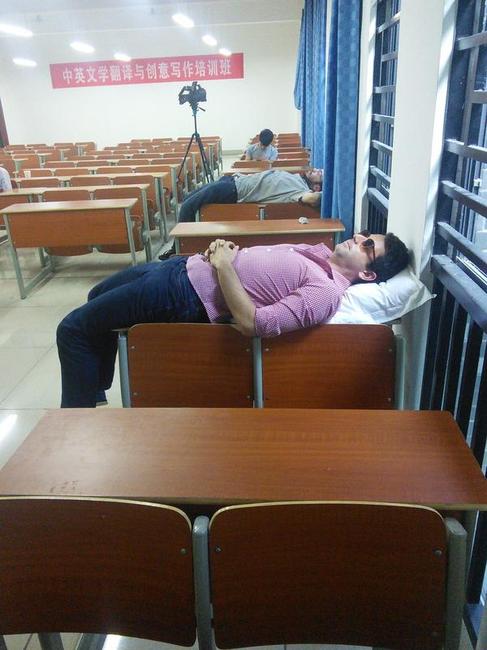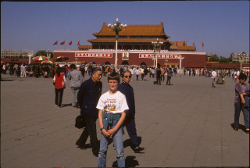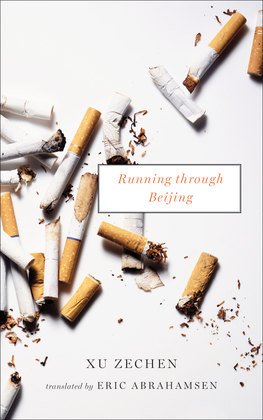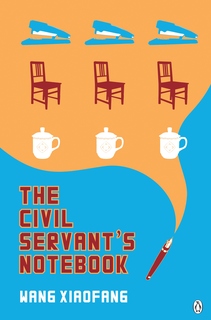Posts
By Eric Abrahamsen, March 8, '15
So I saw Wolf Totem last night, and I think stayed awake for enough
of it to be able to write a short review.
A bit ago Bruce posted some thoughts and questions about the film,
focusing as he does on the ethnic minority angle, and asking about its
depiction of Mongolia and Mongolians.
Having seen the film, I can say with some confidence: it’s not really
about Mongolia at all.
By which I mean, this is a storyline that has been cooked down to its
essentials until it looks more like a film-school exercise in
story-boarding than it does a real story. It ended up being a
prototype for any and all films that follow the “civilized man visits
wise natives and learns their wisdom but doesn’t get the girl” arc.
Sure it’s set in Mongolia, and sure its got wolves, but all the plot
particulars are so rudimentary they feel like placeholders that the
filmmakers later forgot to replace with actual content. The Mongolians
could just be blank blobs tagged INSERT NOBLE SAVAGES HERE. Chen Zhen
might have a sign on his chest reading INSERT NAIVE IDEALIST HERE.
Mongolian is spoken, in exactly the same quantities as Lakota was
spoken in Dances With Wolves, or Na’vi in Avatar. In the same
quantities, and to the same purpose. Those movies – and a barrel more
like them – fleshed out the civilization-meets-savagery theme into
something that (even if you objected to it) had specificity, and the
emotional weight that comes with that. Wolf Totem remains an
insubstantial Platonic ideal.
Even the wolf scenes, sad to say. I did enjoy the night storm scene
with the wolf-pack chasing the horses. The shot of the horses the next
morning was the film’s most arresting visual image. And yet… the
“thrilling” wolf scenes were filmed in an entirely generic way. The
cinematography and the score were more appropriate to Avatar’s
scenes of dragon-riding or attack helicopters than wild animals.
Wolves have their own pace, their own tension, their own menace, and
the camera failed to find that.
Try reading this Q&A with Jiang Rong and you’ll see what I’m talking
about: his comments on the differences between the film and his book
immediately restore a sense of depth and reality to the story. And no
wonder:
- Discussion of ethnic conflict removed.
- Doomed cross-cultural romance added.
- Death of wolf-cub removed.
This last is probably most revealing. Jiang Rong’s first explanation
is “Westerners would not be able to bear this. They would think this
was too cruel, and the animal rights people might protest.” Passing
over that non-sequitur, we come to what feels like the real reason:
…the parts of the film that include the cub are pretty superficial.
People were very moved by the wolf cub in the book because I wrote
about it in great detail. So when the wolf cub dies in the book, many
readers cried. Even I cried while I was writing it. The wolf cub’s
personality is very strong in the book up until its death, so it is a
very complete chain of events.
But since the cub wasn’t very prominent in the early parts of the
film, to have this shocking thing happen to it wouldn’t be very
logical.
In essence: “We took out the most emotionally affecting part of the
film, because the film doesn’t really have any emotion in it.”
I left the theater with the weird feeling that I hadn’t seen a film at
all, merely a description of one.
By Eric Abrahamsen, November 19, '14
Book Expo America, the largest US book fair, is schedule for late May 2015, and a certain ancient civilization is going to be the Guest of Honor. That means BEA is going to get the Frankfurt-2009/London-2012 treatment, with a small army of Chinese writers and publishers and "other" descending on New York for a few weeks.
Right about now is when the list of lucky writers is being compiled, and we'll have some small say in the compilation. They'll take into account which writers have recently published books in English (thanks again to Nicky Harman and Helen Wang for their timely compilation. Now I'm going to the peanut gallery with two additional questions:
- Who among you (translators or publishers) have English-language translations coming out next year, ideally (but not necessarily) in the US, and ideally (but not necessarily) in the first half of the year?
- Publications aside, who do you think should go? Who would make an interesting addition to the delegation?
Please comment here, or email me directly. Thanks!
By Eric Abrahamsen, November 14, '14
Check out the Amazon.com page for the hardback edition of volume one of Liu Cixin's epic sci-fi trilogy, The Three Body Problem. Volume one, translated by Ken Liu and published by Tor Books, has only been out for a few days, and as of today is ranked #683 among all books on Amazon, and #1 among Chinese literature. Holy crap.
Congratulations to Liu Cixin, Ken Liu, and in advance to Joel Martinsen, the translator of the forthcoming second volume.
And to the rest of you Chinese authors… Reach for the stars.
By Eric Abrahamsen, October 6, '14
So it’s been a while since we made any sort of public announcements
about Pathlight magazine, though in fact production has continued
apace. In fact, we’ve got two rather large bits of news.
-
Two issues have gone online more or less at once! How’s that for efficiency. The first is themed around minority/ethnic writers, and features writing by and about China’s ethnic groups. The theme of the second is gender – we started out thinking of it as a women’s issue, but it got a little bit bigger than that. Take a look, and tell us what you think!
Both issues are available as digital downloads on both Amazon and iTunes – we’re experimenting with a lower price, so if you were previously balking at $6.99, see how $3.99 strikes you.
-
The other bit of news is that we’ve had a changing of the guard: after two years and nine issues of Pathlight, Alice Xin Liu is stepping down as managing editor, to be replaced by Dave Haysom, of Spitting Dog fame, and Karmia Olutade, a superlative translator of poetry, and now poetry editor. Thanks and best wishes to Alice, and welcome to the new crew! As usual, you can reach us with suggestions or submissions at info@paper-republic.org.
Look for the next issue, themed around the re-writing of myth and
history, early next month.
By Eric Abrahamsen, September 28, '14
There will be more to say about the Chinese-English Literary Translation Training Course over the next few days, but for now I leave you with an image of Jonathan Rechtman and Austin Woerner hard at work.
It's a brutal, thankless job.

By Eric Abrahamsen, September 15, '14
Chinese Arts and Letters, a literary and academic journal, solicits
English-language contributions for issue No. 3. Texts not exceeding
10,000 words will be considered, consisting of translations of
contemporary Chinese-language literature in any genre, essays on the
Chinese arts and letters of any era, and creative writing in any
genre about China. Translated texts or inquiries for translations
must also submit the original Chinese text, and all translations will
be reviewed for accuracy and style. Payment for contributions is 0.80
RMB per word (contributions) or per Chinese character (translation),
before tax. Texts with a focus on Jiangsu may be given special
consideration.
Please address inquiries or submissions to the editors at
chineseartsletters@gmail.com or chineseartsletters@163.com The
deadline for inquiries for issue No. 3 is December 31, 2014; the
deadline for submissions is January 31, 2015.
By Eric Abrahamsen, September 3, '14
If I were a political cartoonist, of the WWII-era ilk where they label
everything in the cartoon so the point gets across better, I would
draw a cartoon to illustrate China’s “Going Out,” the policy which is
meant to bring Chinese culture to the rest of the world, and it would
look something like this:
A patch of land representing China; in the center stands The Leader
(it says that on his chest). He gazes off into the distance, one hand
pointing outwards in the best 指点江山 style, and the words “Going Out
Policy” are written on that sleeve. The other hand is loading
sumptuous food onto crescent tables to either side of him. The food
could be labeled “Government Budget,” but that should be
self-explanatory. Seated around the outside of the tables are a host
of people we could label “Government Functionaries,” until I think of
something better.
The functionaries are shoveling food into their mouths, their gazes
fixed in rapt devotion upon The Leader. They’ve all scootched
backwards until their rear ends hang out over the border of China, and
they’re saying things to The Leader like: “We have ‘Gone Out,’ and it
is wonderful!,” and, “The foreigners are all amazed!”
Meanwhile, a few big-nosed foreigners (in berets and cowboy hats!) are
standing around the outside of the border, looking at this line of
plumber’s cracks, and asking each other, “What on earth are they
trying to tell us?”
If only I could draw…
By Eric Abrahamsen, August 29, '14
That wasn’t so hard after all – the CWA has given us the list of the
25 translation fund recipients for the last round of funding. What we
don’t know are the details of translator/publisher (though in many
cases you can guess), or how much funding will actually be supplied.
But still, it’s an interesting list – see it below, after the jump.
In the meantime, the deadline is nearly up for the next round of
funding for both the general CWA program, and its ethnic-minority
fiction funding program. The ethnic-minority funding applications will
be reviewed next month, and the contemporary fiction applications the
month after, so time is short. If you’ve got all the necessary
materials on hand (and the publishing contract is already signed), you
can first send a digital version of the application to the Writers
Association at dreamworker2013@163.com.
More…
By Eric Abrahamsen, August 25, '14
Towards the end of last year, the China Writers Association announced the inception of two new literary translation funds, one for general fiction, and the other specifically for minority fiction. Many applications were submitted, and then we all commenced to wait. And wait, and…
We started to suspect that the whole thing had foundered on some hidden bureaucratic sandbar, but just recently we heard that the program is, in fact, still under way – not only that, the CWA is actually ready to announce its first round of winners. Not announce, exactly: the winners will be contacted on the down-low. We're trying to convince them that publicizing the full list is in everyone's best interest, but it's not clear if that argument will take.
If you applied for funding, and have been chosen, expect to get that news "soon". The translators among you will know how to translate that "soon" into English. You publishers can probably also figure it out.
If you applied and didn't get it… you may never know! Unless we can talk them into publicizing the list.
By Eric Abrahamsen, August 12, '14
The deadline for the CELT translation training course has been extended to August 18 (2014), since (for reasons I personally cannot fathom) the number of applicants to date has amounted to something less than a tidal wave.
I want to emphasize what a worthwhile thing this is: personally, the two courses I attended were not only the most helpful things I've done for my development as a translator, they were also instrumental in the solidification of a society of C-E literary translators, a social circle or support group, a mafia even. And needless to say they were a hell of a lot of fun. So do it, already!
See below, and after the jump, for more details:
The Chinese English Literary Translation course will run from 22nd to 27th September 2014 in the Yellow Mountains. The course will offer a mix of literary translation and creative writing workshops, with guest speakers.
More…
By Eric Abrahamsen, July 21, '14
The notorious – nay, infamous – Chinese-English Literary Translation course is coming around for its third incarnation this coming September (2014). For five days, translators and writers will gather in Huangshan to pick each other's brains, watch each other work, and try to teach each other a little something. Be part of the event that has launched so many illustrious translation careers! Or at least, introduced some fairly interesting people to one another.
This time, the course is being run by the Foreign Languages Teaching and Research Press (FLTRP), in partnership with the British Centre for Literary Translation (BCLT), and SAPPRFT.
The course will be held this fall, September 22 to 27. The application deadline is August 10: be sure to send your completed application form and a scan of your passport to translation@fltrp.com before then. Attendance free, but you'll have to get yourself there, and also pay for room and board (I had this wrong intially, my apologies!).
The Chinese-to-English writers and workshop leaders are:
- Li Juan, 李娟, led by Andrea Lingenfelter
- Li Pingyi, 李平易, led by Bonnie McDougall
- A Yi, 阿乙, led by Eric Abrahamsen
For more information about the course, you can download the full information sheet.
By Eric Abrahamsen, May 24, '14
We're not blocked, are we? 'Course, it's hard to tell these days, they seem to be blocking most everything…
By Eric Abrahamsen, April 22, '14
The following review of Hong Ying's Daughter of the River, by Karen Ma, first ran on the NPR website
Hong Ying's autobiography, Daughter of the River, is doubly astonishing. First, it's an account of the Cultural Revolution that's not written by an intellectual. There's a certain genre of Chinese memoir that looks at upheaval under Mao through an elite lens, and I have to admit, I've been growing tired of those books. But Hong Ying comes from a very different background indeed.
I saw her speak at a literary festival in Jaipur, India in 2011, where she told the audience how she grew up along the Yangtze River in the slums of Chongqing — China's largest and most crowded city — and survived the great famines and Mao's failed political campaigns as a bastard child in abject poverty. I bought her memoir immediately. Her speech had touched me — but her book blew me away.
More…
By Eric Abrahamsen, February 10, '14
The Vermont Studio Center invites applications for its Chinese Poetry & Translation Fellowships Program supported by the Henry Luce Foundation. In 2014, VSC will award 12 outstanding Chinese poets and literary translators with 4-week joint residencies to create new work individually and in collaboration as part of VSC’s diverse creative community.
Applications for the next round of VSC/Luce Foundation Chinese Poetry & Translation Fellowships are available online or in printable form as part of VSC’s April 1, 2014 international fellowships deadline.
2014 VSC/Luce Foundation Chinese Poetry & Translation Fellowships:
- Six awards for outstanding poets living anywhere in the world whose primary language is Chinese. These awards include roundtrip travel and a discretionary stipend.
- Six awards for talented English-language translators working with Chinese poetry. These awards include a discretionary stipend.
These fellowships are available to individual poets and translators, as well as established working pairs, with fellowships awarded (and individuals ultimately paired) by a distinguished selection committee. If an established pair wishes to apply together, each person must submit an application and each must identify his/her preferred working partner. Applicants who wish to be considered as a pair should also select the same preferred residency dates. Due to the joint structure of these residencies, once an applicant (or pair) has been accepted, there may be little to no scheduling flexibility. For all VSC applicants, at least partial fluency of English is advised for participants to gain the greatest value from their residency experience. In addition to rendering exceptional translations on paper, translators should also be conversant enough in the writer’s primary language to help facilitate exchange with their working partner.
By Eric Abrahamsen, February 6, '14
The deadline is May 26 for the Susan Sontag Prize for Translation, a 5,000 USD grant for a literary translation from Mandarin Chinese. Translators under 30 years of age can submit proposals for translations projects (fiction or letters) expected to be completed within a four-month period – July to November, 2014. See the link above for more details.





